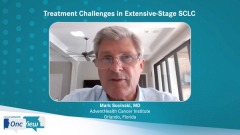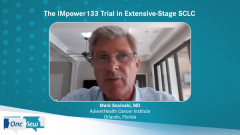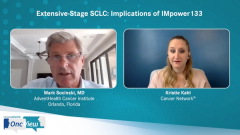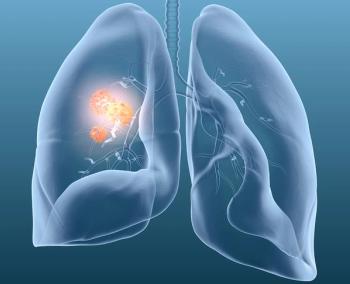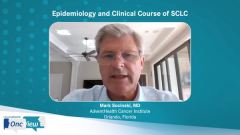
Small Cell Lung Cancer: Risk and Prognosis
Benjamin Levy, MD, of the Johns Hopkins Sidney Kimmel Comprehensive Cancer Center, comments on risk factors and the prognosis for patients diagnosed with small cell lung cancer.
Episodes in this series

Kristie Kahl: Welcome to the CancerNetwork®’s OncView video series titled “Updates in the Management of Extensive-Stage Small Cell Lung Cancer.” Our discussion is going to focus on recent advances in the frontline management of extensive-stage small cell lung cancer. Welcome. Let’s begin. Dr Levy, how common is small cell lung cancer?
Benjamin Levy, MD: It’s important to make a distinction between non–small cell lung cancer and small cell lung cancer. These are very different cancers. Those are the 2 main types of cancer. There are roughly 250,000 cases of lung cancer a year, and it looks like for small cell, the percentage is going down. If you look back around maybe 5, 10, even 15 years ago, the percentage of small cell lung cancer was around 20% of all lung cancer. That number has fallen over the past 10 years to about 10% to 15%, and that’s probably reflective of the fact that small cell, as we’ll talk about, is intimately associated with smoking and a heavy smoking history. Now that smoking rates are going down, small cell lung cancer cases are also going down. Cases are still out there and still common. I see it quite frequently in my office, but not as much as I’m seeing non–small cell lung cancer.
Kristie Kahl: What are the risk factors for small cell lung cancer?
Benjamin Levy, MD: It’s pretty straightforward with small cell lung cancer. We view small cell lung cancer through the prism of a smoking-related disease. There’s an intimate association between smoking and small cell lung cancer. Again, it’s important to make a distinction with non–small cell lung cancer. We know that 20% of non–small cell lung cancer is never-smokers. That is not the case for small cell. The main—really the sole—risk factor for small cell lung cancer is smoking. I would say probably 95% to 98% of all small cell lung cancer patients have a smoking history and a heavy smoking history.
There are cases where you may have a small cell lung cancer not associated with smoking. There are de novo cases of small cell that aren’t smoking related, and we really don’t know what the risk factor is. Importantly, for patients who are EGFR mutated, this is a type of non–small cell lung cancer. A certain percentage of those patients, when they have disease progression on a targeted therapy, can evolve into a small cell lung cancer and it’s a unique phenomenon. We’re still trying to iron this out and how to treat it, but that’s a scenario in which you may have a small cell lung cancer that’s not related to a prior smoking history.
Kristie Kahl: What are the stages of small cell lung cancer, and what is the typical course of progression?
Benjamin Levy, MD: It’s always important to make distinctions between non–small cell lung cancer and small cell lung cancer when we’re talking about staging. In non–small cell lung cancer, we have several stages that can be quite nuanced. With small cell lung cancer, it’s quite straightforward. There is limited-stage small cell and there is extensive stage. Limited stage basically means that the tumor can be encapsulated within a radiation field or viewed within a radiation field, and that radiation can target the entire tumor. These are tumors that are generally confined to 1 lung or regional lymph nodes. Everything else, which is extensive-stage lung cancer, is essentially a lung cancer that’s moved outside the lung into other parts of the body, most often the liver, adrenal gland, bone, and unfortunately, the brain. These are common scenarios that are common types of patterns seen with small cell lung cancer, and extensive-stage small cell lung cancer.
Unfortunately, the majority of patients with small cell lung cancer present with extensive-stage disease, so extensive disease comprises probably 75% to 80% of all small cell lung cancer, with only 20% being limited-stage disease. That’s an important distinction because it does drive treatment decisions, and we can certainly talk about those. With limited-stage small cell lung cancer, we’re generally going for cure, although the rates are low. We’re going for cure with a concurrent chemoradiation approach. With extensive stage, we’re unfortunately just going for palliation with systemic chemotherapy. Fortunately, the advent of immunotherapy also plays a role in extensive-stage disease.
Kristie Kahl: What’s the prognosis for patients with small cell lung cancer, and what are the known prognostic factors?
Benjamin Levy, MD: Unfortunately, the prognosis for small cell lung cancer is certainly not as good as non–small cell lung cancer. In terms of some of the prognostic indicators that we know about, poor performance status is 1. Patients who have a poor performance status generally don’t do as well. Weight loss is certainly considered to be a poor prognostic indicator. The continuation of smoking may contribute to chemotherapy resistance, and also the extent of the disease is certainly going to correlate with outcomes. Also, the paraneoplastic syndromes that occur with small cell are a little less understood, and they also can certainly cause issues in terms of worsening outcome.
When we look at the overall prognosis of small cell, unfortunately, this is a historically progressive disease. It is difficult to treat. Responses happen with chemotherapy, but progression is generally universal. For limited-stage small cell lung cancer, where you’re going for cure, you can cure a percentage of patients. Routinely 10% to 15% of patients can be cured with limited-stage disease. Unfortunately, a lot of those patients will relapse, and the median survival time for these patients is generally around a 1½ to 2 years. For extensive-stage small cell, where the treatment is palliation and extension of life, we are looking at median survival times that range anywhere from 10 to 12 months, maybe a little longer. Of course, the advent of immunotherapy with chemotherapy, which we’ll talk about, has improved outcomes, but we’re still really wrestling with how to best treat these patients.
Kristie Kahl: What makes small cell lung cancer so difficult to treat?
Benjamin Levy, MD: That’s a relevant and a good question. Why is it that small cell lung cancer is so difficult to treat? We’re still trying to understand this. Some of the data originally put out with immunotherapy showed that immunotherapy worked best for patients who smoked the most. This is a smoking-related cancer, so you would think that immunotherapy would really work well for small cell. The gains we’ve witnessed with immunotherapy have been modest. This is a complex tumor biology. We’re still trying to understand the underlying genomic features that make this so hard. These tumors are rapidly dividing and have a proclivity to metastasize early. Unfortunately, they develop resistance in a fairly short amount of time. While chemotherapy can kill these cells, they are prone to resistance and grow aggressively. I hope I have better answers if you ask this question in the next 5 to 10 years: why this tumor biology is so complex. It’s fraught with genetic mutations that have a high tumor mutational burden, and this translates into being a historically aggressive disease.
Transcript edited for clarity.
Newsletter
Stay up to date on recent advances in the multidisciplinary approach to cancer.



